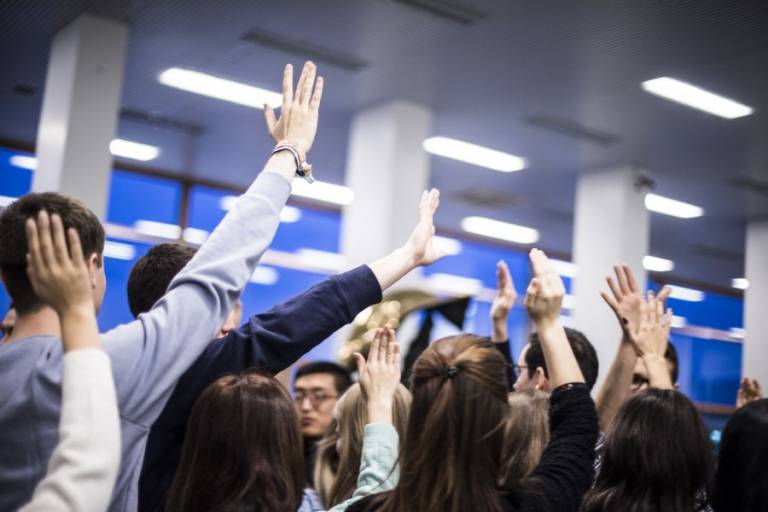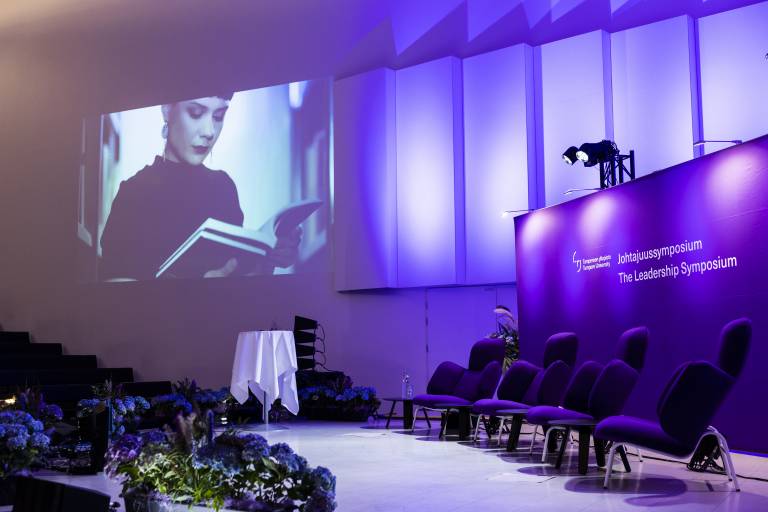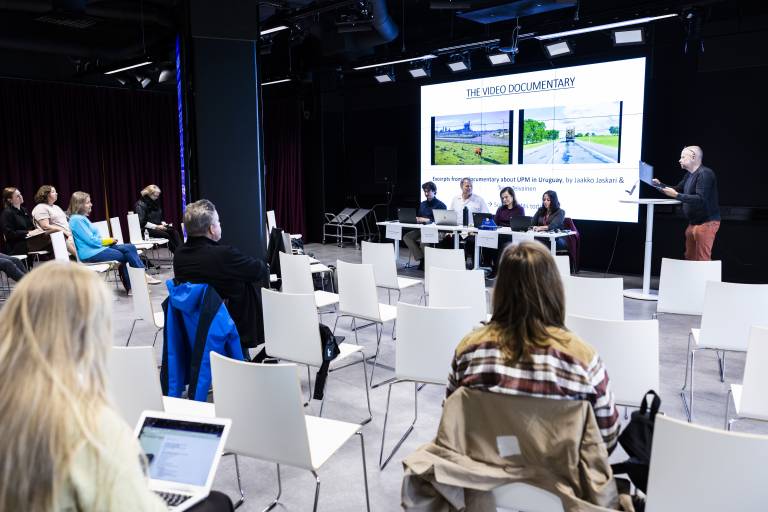The theses portray the interdisciplinarity of the LFC master’s programme in politics, governance and business studies. The topics of theses include the meanings of “nature” in the nature-based solutions; Soviet ghosts in the Russian hydrocarbon culture; integration of immigrants and the role of cities in the Helsinki Metropolitan Area; experiences of international women in the business sector; and collaboration towards a more sustainable sports community.
Read below the short abstracts of each work with more details on the authors, findings and links to full texts.
Raysa França’s master’s thesis Nature in nature-based solutions: understanding the discourses of nature in the UNaLab project in Tampere, Finland focuses on nature-based solutions (NbS) through one specific project, the UNaLab (Urban nature lab), an urban living lab that implemented NbS in the city of Tampere, Finland. The present thesis is an exploratory case study that investigates the meanings of nature expressed by the discourses of implementation of the UNaLab project through discourse analysis. Data were generated from five (5) semi-structured interviews, one (1) focus group, one (1) participant-observation visit in one of UNaLab’s events (invasive species workshop), and six (6) blog posts. The findings indicate that there is no clear and unified understanding of nature across the UNaLab implementation discourses. Whereas some discourses expressed cartesian meanings of an objectified reality, other discourses highlighted nature’s imaginaries as kinship and ancestry. Some discourses echoed a technocratic discourse over the management of nature, which prescribes a technical treatment over the definition of problems around NbS. The findings indicate that meanings and views of nature go through a process of projectification, which filters the worldviews and meanings of nature.
Victor Théorêt’s master’s thesis Soviet Ghosts in the Russian Hydrocarbon Culture aims is to investigate the spectral presence of the Soviet past in that hydrocarbon culture. Concepts of haunting and spectres refer primarily to the philosophical work of Jacques Derrida. The two research questions are: How does the Soviet past haunt the hydrocarbon culture in Russia? How does this haunting presence affect the virtuality of a decarbonised energy future? The research materials come from two sources: the primary materials are five biographical profiles of workers on the website of Russia’s biggest gas producer, Gazprom; secondary literature consists of prior research used to identify the spectres. This hauntological research unveil the haunting of the Soviet past in the selected publications of Gazprom. The study found that the haunting of Soviet work culture invocates the ghosts of the New Soviet Man and the Stakhanovite movement. More, the spectres of the Soviet patriarchy and the Soviet empire haunt as well the Gazprom content. Among the conclusions, engaging with the Soviet spectres is recommended to settle and re-narrate the past. Thus, an energy narrative for a decarbonised future can be construct freed from Soviet ghosts.
Saana Tarhanen’s master’s thesis Two-way Integration of Immigrants and the Role of Cities in the Helsinki Metropolitan Area has three main research questions: first, how civil servants understand the principle of two-way integration and its implications for administration; second, if the idea of urban citizenship is present in integration policies of the area; and third, to what extent integration policies of the cities fall to the categories of assimilation, multiculturalism and interculturalism. The cities of Helsinki, Espoo and Vantaa have been considered as pioneers in Finnish integration work, and therefore this study concentrates on these cities by analyzing their policy programs and interviewing civil servants of integration units. The results of the study show that cities of the metropolitan area are still forerunners in developing integration practices based on their long experience, good resources for development work, and political will. They follow national alignments but also do integration policies based on their own local needs, utilizing municipal autonomy. Pragmatism is emphasized: needs of almost every fifth resident cannot be ignored. Urban citizenship thinking is understood as a built-in principle in the Finnish society: basic services are arranged by municipalities, and everyone has a right to use them, despite of their citizenship status. Further, as the volumes of immigration to the metropolitan area have increased, the cities have moved from multiculturalism towards interculturalism: people are not treated as members of cultural or religious groups but as individuals in public services, which also requires the services to become more accessible to diverse population. Two-way integration is recognized as an important principle in the metropolitan area, even though there is still work to do to fully achieve it. Cities understand two-way integration as a four-level framework where municipal administration, third sector, private sector and ordinary residents of the city should all change their action so that they would become more receptive to immigrants. Cities can support two-way integration in both public and private life by altering their own practices at strategical and practical levels, and by supporting other actors in the change. Cooperation with NGOs and private sector are essential for supporting two-way integration between ordinary people.
Katarina Sladakovic’ master’s thesis Building a Career in Finland: Experiences of International Women in the Business Sector explores how gender, foreignness and professional identity come together and shape the career building experiences of skilled international women in Finland. The main aim is to provide a better understanding of the totality of their experiences, career challenges and opportunities they experience, resources and strategies they use to navigate their career development in Finland. This research was conducted using a biographical narrative interview method. Twelve international women living and working in Finland were interviewed, coming from diverse backgrounds, countries of origin, professions, and industries. This study suggests that all three factors – gender, foreignness, and professional identity – are relevant to understand the career building experiences of international women. In addition, the study points out the interplay between those factors and highlights their intertwined nature. Overall findings suggest that building a career in Finland brings both challenges and opportunities for skilled international women. Challenges are mainly associated with the lack of career capital, language skills, and pressure to demonstrate their commitment to staying in Finland. In addition, findings suggest gender equal nature of the Finnish society can create challenges for women coming from less gender equal backgrounds. Career development opportunities are associated with identified features of the Finnish working culture. Those features include low vertical hierarchy, access to top management, high level of trust, freedom and autonomy, knowledge sharing, organizational openness to exploring different career paths within the organization and learning in all phases of a career.
Teemu Korvenpää’s master’s thesis Collaborating Towards a More Sustainable Sports Community: Case Study on the Initiation of Sustainable Sports 2020–2024 aims at gaining a thorough understanding of the implementation of the first inter-organizational sustainability programme ‘Sustainable Sports 2020–2024’ in the Finnish Olympic Committee (FOC) and sports federations during the beginning steps of the programme. To fulfil its purpose, the study asks: “How is the implementation of Sustainable Sports 2020–2024 approached by the Finnish Olympic Committee and sports federations during the initiation phase?” Theoretically, central to the research is the approach to Sustainable Sports 2020–2024 as a collaborative strategy. In addition, the literature review addresses collaborative strategic management, organizational strategy implementation as well as the concept of implementation structure. The empirical data consisted of five semi-structured interviews, four event observations, and a review of key documents. The study shows that at the collaborative level, central to Sustainable Sports 2020–2024 implementation has been comprehensive collective practices aimed at capacity building, mutual learning, and networking of partner organizations. Above all, the implementation has manifested as an organization- and federation-specific adoption and adaptation at the organizational level. In addition to promising engagement, comprehensive collaborative practices, and adaptive organizational actions, the implementation structure analysis reveals areas for development related to further networking as well as monitoring and evaluation. The results of the analysis are used to deduce managerial implications for the future implementation of Sustainable Sports 2020–2024. Furthermore, the study confirms previous research on collaborative strategic management, collaborative strategies, and strategy implementation.





